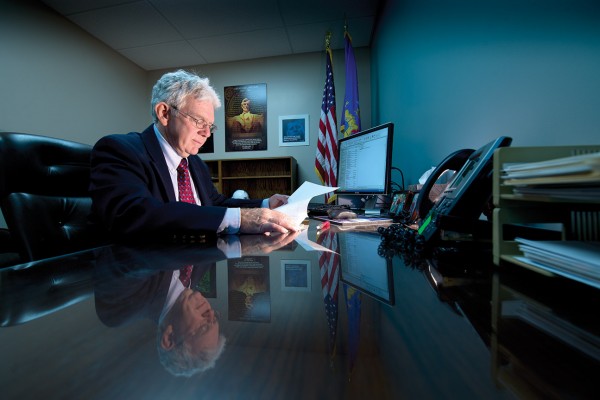Wis. commission searches for money to continue advocacy work
By: Eric Heisig//September 23, 2013//

It took a decade for the country’s first access to justice commission to figure out what problems it wanted to solve.
In the following decade, the Seattle-based Washington State Access to Justice Board successfully lobbied for increases in private and public money for legal aid and to establish the state’s Office of Civil Legal Aid as a separate and independent agency in the judicial branch.
“There’s a process of tunneling in and becoming part of the infrastructure these commissions go through in each state,” Joan Fairbanks, the Washington group’s justice programs manager, said. “It takes years.”
The Wisconsin Access to Justice Commission may not have that many years left, however.
Formed in 2009 by a Wisconsin Supreme Court rule, the commission is supposed to improve and encourage measures that make it easier for those who cannot afford an attorney to negotiate the legal system.
But four years into building its cause, the commission is struggling to find more money to support its work.
“At the same time it’s trying to get established,” Commission Treasurer Hannah Dugan said, “it’s directly addressing major shifts in the legal aid landscape.”
Gov. Scott Walker and the Legislature this year passed a biennial budget that included no money for civil legal services, zeroing out a previously allocated $2.8 million. And there are fewer attorneys available to provide pro bono work, Dugan said, because law firms laid off attorneys and cut back on hiring since the recession.
Still, the demand for indigent legal services is greater than ever, she said, so commission members are trying to find a way to continue their work.
When Wisconsin justices established the state’s ATJ commission, they mandated that the State Bar cover expenses for “at least three years.” The bar, in turn, set aside $300,000 in a reserve, and more than $240,000 of that will have been used by the end of this fiscal year to pay for supplies, travel expenses and the hours State Bar staff liaison Jeff Brown and his assistant spend working on commission activities.
The state Supreme Court rule establishing the commission stated that the justices would “evaluate the progress made by the commission … and its funding and staffing needs and determine the continued existence of the commission.”
State Bar spokeswoman Andrea Gage said about $57,000 will be left in the reserve in June.
Commission President Gregg Moore said that may not be enough to get it through another fiscal year. And he said it is not clear where, or if, more money will come.
Moore said State Bar Executive Director George Brown told him in February that the bar would not give the commission more money.
George Brown said in an interview, however, that the commission has not yet submitted a proposal for money for the next fiscal year.
Furthermore, Moore said, he asked the Wisconsin Court System for more money but received no commitment. If the State Bar, the courts and the Legislature choose not to help, he said, the commission probably will not continue.
For now, Moore said, he is looking to private businesses and applying for grants to get money for the commission.
Aside from Jeff Brown, who devotes about a quarter of his time at the State Bar to commission activities, Wisconsin’s ATJ comprises 15 volunteers from across the state.

But people from across the country who are involved with the commissions agree that a successful ATJ needs paid staff members who can dedicate their full attention to the work.
In Texas, for example, the state’s commission credits itself with pushing lawmakers to allocate more money for legal aid services over the past few years. That work was achieved, Executive Director Trish McAllister said, with the help of the commission’s four full-time employees, as well as volunteers.
“I’m so amazed with the states that have part-time people,” McAllister said. “I can’t imagine doing what we do on 20 hours a week or only volunteers or no staff.”
Improving access to justice is “impossible” without continuous staff member support, said Ada Shen-Jaffe, a Seattle University School of Law professor and one of the founders of the Washington commission.
“It’s a recipe for failure,” she said.
Moore said he is aware of staffing levels in other states and recognizes the importance. He said the Wisconsin group’s staffing level “is about the minimum” that can be effective.
Limited as it is, Wisconsin’s commission has earned the respect of George Brown and Chief Justice Shirley Abrahamson, who both said they appreciate the group’s work so far.
George Brown specifically lauded an educational video the commission created to advocate for access to justice efforts, as well as six public meetings the commission held to discuss civil legal services, the findings of which are compiled in a yet-to-be-released report.
“The need is broad and is varied depending on geography,” Brown said. “It’s tough to address.”
David Armstrong, the director of the Indian Law Office for Wisconsin Judicare, said the commission has encouraged discussion about the effects of self-representation in tribal courts. The commission’s involvement, he said, gives credence to the idea that “what is happening in our tribal community has collateral effects for the entire state.”
Some, such as Nick Zales, a Milwaukee attorney and member of the bar’s Board of Governors, said the commission isn’t living up to its promise, however.
Zales said he was supportive of the commission when it was created and he still believes in its goals. But one of the commission’s main goals, he said, was to secure state money for indigent legal services, which it has not yet done.
“I wish it was succeeding, but it doesn’t seem to be,” Zales said. “Perhaps the Board of Governors should take a look at it and say ‘It doesn’t seem to be working the way we envisioned it.’”
But Dugan said others don’t yet realize the value of the group’s efforts. If they did, she said, the money would come.
“The message needs to be that it’s worthy of functioning,” she said.
Proving the worth of ATJ commissions is a problem nationwide, however, said Richard Zorza, a Washington, D.C.-based attorney and consultant. The American Bar Association lists 28 commissions across the country, and, Zorza said, the groups vary in how they measure progress.
There has to be some consistency, he said, some way to explain what it is about a commission that makes it work.
“We don’t really have good answers to that,” Zorza said.
Fairbanks said that after 19 years, the Washington commission has found many of those answers, but it was not easy.
“The big lesson, big challenge for these commissions is that a lot of people expect instantaneous success and changing the system,” she said. “Our justice system is very slow moving.
“It takes a very, very long time to change not only the system, but the hearts and minds of the system.”
Legal News
- Former law enforcement praise state’s response brief in Steven Avery case
- Eric Toney announces re-election bid for Fond du Lac County District Attorney
- Former Wisconsin Democratic Rep. Peter Barca announces new bid for Congress
- Republicans file lawsuit challenging Evers’s partial vetoes to literacy bill
- More human remains believed those of missing woman wash up on Milwaukee Co. beach
- Vice President Harris returning to Wisconsin for third visit this year
- Wisconsin joins Feds, dozens of states to hold airlines accountable for bad behavior
- Trump ahead of Biden in new Marquette poll
- Bankruptcy court approves Milwaukee Marriott Downtown ‘business as usual’ motion
- New Crime Gun Intelligence Center to launch in Chicago
- Arrest warrant proposed for Minocqua Brewing owner who filed Lawsuit against Town of Minocqua
- Wisconsin Supreme Court justices question how much power Legislature should have
WLJ People
- Power 30 Personal Injury Attorneys – Russell Nicolet
- Power 30 Personal Injury Attorneys – Benjamin Nicolet
- Power 30 Personal Injury Attorneys – Dustin T. Woehl
- Power 30 Personal Injury Attorneys – Katherine Metzger
- Power 30 Personal Injury Attorneys – Joseph Ryan
- Power 30 Personal Injury Attorneys – James M. Ryan
- Power 30 Personal Injury Attorneys – Dana Wachs
- Power 30 Personal Injury Attorneys – Mark L. Thomsen
- Power 30 Personal Injury Attorneys – Matthew Lein
- Power 30 Personal Injury Attorneys – Jeffrey A. Pitman
- Power 30 Personal Injury Attorneys – William Pemberton
- Power 30 Personal Injury Attorneys – Howard S. Sicula











